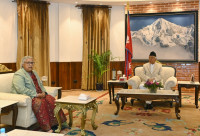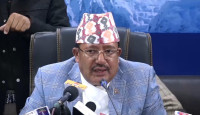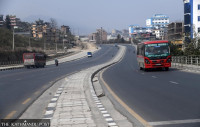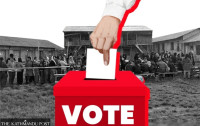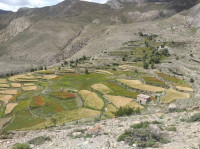National
How Hindu state idea is trying to gain ground in Nepal
Analysts say it is not easy to undo the achievements guaranteed by the constitution, but threats remain.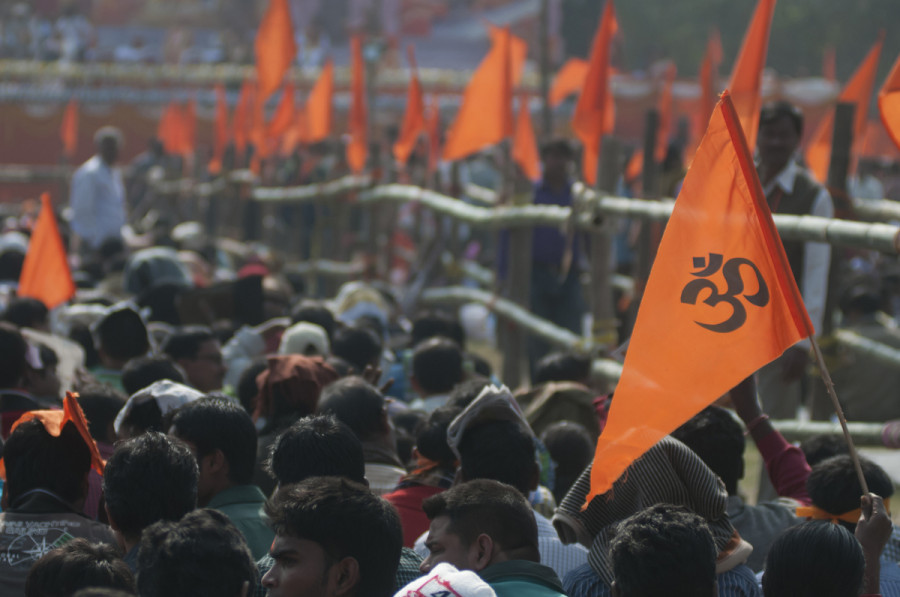
Anil Giri
On Thursday, a group of people launched a campaign for the restoration of Hindu kingdom. The campaign is led by Rookmangud Katawal, a general who led the Nepal Army from 2006 to 2009. Named “Hindu Rastra Swabhiman Jagaran Abhiyan”, the campaign, organisers say will be expanded across the country “to restore Nepal as a Hindu state” with the focus on “identity and culture.”
Two weeks back, around 20 Hindu religious organisations formed what they called “a united front” in Devghat in Tanahun district and announced to take to the streets for the restoration of Hindu state.
Several people the Post spoke to said the campaign is backed by hundreds of thousands disciples of “maths and piths”, the places where Hindu education and culture are taught and promoted.
Thursday’s event, held in Lalitpur, was attended by several prominent pro-Hindu figures like Mathadish of Shankarachayra Math Keshavananda Swami, Pithadish of Shantidham in Kathmandu, Swami Chaturbhuj Acharya, Hanuman ji Maharaj, and co-convener of Hindu Swayamsevak Sangh and former Nepal Police assistant inspector general Kalyan Kumar Timilsina.
“Our campaign is not to establish Hindu fundamentalism in the country… not to isolate and sideline the religious minorities like Muslims and Christians,” Katawal told the Post in a brief interview. “This campaign is simply aimed at restoring the Hindu identity of Nepal.”
According to Katawal, their mission is to create awareness about Hindu religion, its culture and how it is different from others.
“And we are different from politics. Our campaign has nothing to do with any political ideology and we are not here to establish Hindu fanatics,” Katawal told the Post. “The Sanatan Hindu tradition has been practised for centuries and it is tolerant and friendly to other religions. So we do not discredit or sideline other religions.”
The Hindu campaign comes at a time when questions are being raised about the six-year-old constitution that established the country as a secular republic.
Analysts say the calls for a Hindu state could further grow as some sections within Nepal’s political parties, which played a crucial role in transitioning the country to a republic state, are showing an inclination towards reverting to the previous status.
The threat to the political achievements was fuelled by erstwhile prime minister KP Sharma Oli, who despite claiming to be a communist leader, started talking about Hinduism. From visiting Pashupatinath temple to trying to establish Thori as the real Ayodhya, the “real” birthplace of Ram, the Hindu god, Oli fanned the flames of Hinduism in Nepal.
At a time when concerns are being raised that some major achievements like federalism and secularism are facing threats, such rise of what some say “saffron politics” is a cause for concern, observers say.
“When democracy, system and institutions get weakened and liberal value systems are affected, such regressive ideas try to raise their heads,” said Lok Raj Baral, a former political science professor. “It’s for the political parties and leaders who played a crucial role in transforming the country to now reiterate what they believe in.”
According to Baral, Hindu state has become a sentimental agenda in Nepal.
“Since the rise of the Bharatiya Janata Party in India, a section of people is under the impression that Nepal could be reverted to Hindu state,” said Baral. “But a state does not have a religion and every citizen irrespective of what religion they follow should be able to say the state belongs to them. That’s the beauty of democracy. That’s the beauty of what we have achieved through various struggles.”
Nepal became a federal, secular republic after the 2015 constitution.
However, the fledgling constitution is already facing the threat of being unravelled. Not only Oli and some members in his CPN-UML party, a section of the ruling Nepali Congress too believes Nepal should remain a Hindu state.
Observers say the campaign for Hindu state may strike a chord or two with a section of society, but the likelihood of undoing what the constitution has guaranteed is not possible.
Even the Hindu campaigners are not very sure about what they want to achieve.
“Our movement so far has been directionless, to tell you the truth, as no one is in charge,” said a leader of a pro-Hindu organisation who did not wish to be named. “We need a ‘powerful movement’ across the country to reverse the decision taken about a decade and a half ago. This seems to be a silent movement with no one leading.”
Though Nepal officially became a secular republic with the promulgation of the new constitution in 2015, the first meeting of the Constituent Assembly in 2008 had consigned the monarchy to history and declared that Nepal was no more a Hindu state.
The only political party that has consistently made a pitch for a Hindu state and constitutional monarchy is the Rastriya Prajatantra Party. But it lacks influence. In recent days, Rabindra Mishra, a journalist-turned-politician, drew quite some attention when he spoke against federalism and favoured monarchy.
Sources inside several Hindu outfits say that besides Vishwa Hindu Mahasangh, Vishwa Hindu Parishad, Hindu Swaymsevak Sangh, Sanatan Dharma Sewa, Omkar Samaj and Nepal Rastrabad Samaj, at least one dozen pro-Hindu groups are active in Nepal.
Multiple people within these organisations the Post spoke to said that India’s Rashtriya Swayamsevak Sangh and Yogi Aditya Nath, the chief minister of Uttar Pradesh in India, have been supporting movements in Nepal for the restoration of Hindu state. They, however, would not say whether the Bharatiya Janata Party, or Indian Prime Minister Narendra Modi, had a direct stake in the campaign.
“But you cannot ignore their tacit support,” a pro-Hindu campaigner in Nepal said.
A senior security official told the Post that at least 100 Hindu organisations are active in Nepal.
“Some of them are volunteer organisations and others have received funds from different sources inside and outside the country,” said the official who spoke on condition of anonymity. “There is a massive rise of pro-Hindu movement across the country in the last two to three years.”
One section that is promoting the Hindu campaign is within the Nepali Congress.
Shanker Bhandari of the Nepali Congress in 2018 led a campaign within the party for the restoration of the Hindu state. After most of the leaders refused to entertain the agenda, it failed to get traction.
“Out of 1,400 mahasamiti members of the Congress, 734 had signed for the restoration of Hindu state,” said Bhandari. “This will be a top agenda item when our party holds the general convention in November.”
Though Congress President Sher Bahadur Deuba, who is currently the prime minister, and senior leader Ram Chandra Poudel, among others, have been rejecting the Hindu state idea, there still is a big section within the party that favours reinstating Hindu state.
Party General Secretary Dr Shashank Koirala, senior leader Shekhar Koirala and several other central committee members are in favour of reviving Nepal as a Hindu state.
Both Koiralas and other Nepali Congress leaders have demanded a referendum so as to determine whether Nepal should be a Hindu state or a secular country.
“Several organisations that are active in the country will put pressure on all major political parties for the revival of Hindu state,” said Bhandari who still believes sooner or later Nepal will once again become a Hindu state.
But pro-secularism leaders say Nepal has come a long way since the constitution was promulgated in 2015 that guaranteed secularism and republicanism.
“At a time when we are facing a host of challenges, such a regressive campaign would derail the entire process,” said Dev Gurung, a Standing Committee member of the Communist Party of Nepal (Maoist Centre). “We respect the sentiments of the people, but this is not the time to pick up the Hindu agenda, when we have to march forward.”
According to Gurung, some foreign forces are trying to undo what Nepal has achieved in recent years.
“We cannot alter the system we have built,” said Gurung. “Those who are trying to revert Nepal to the old days are the enemies of the people. Now is the time to strengthen the political and constitutional setup we have.”




 11.36°C Kathmandu
11.36°C Kathmandu

